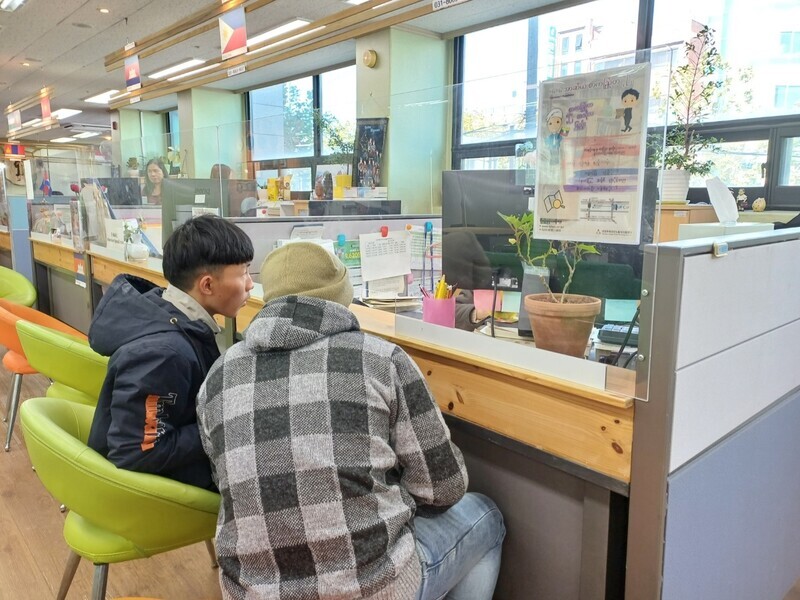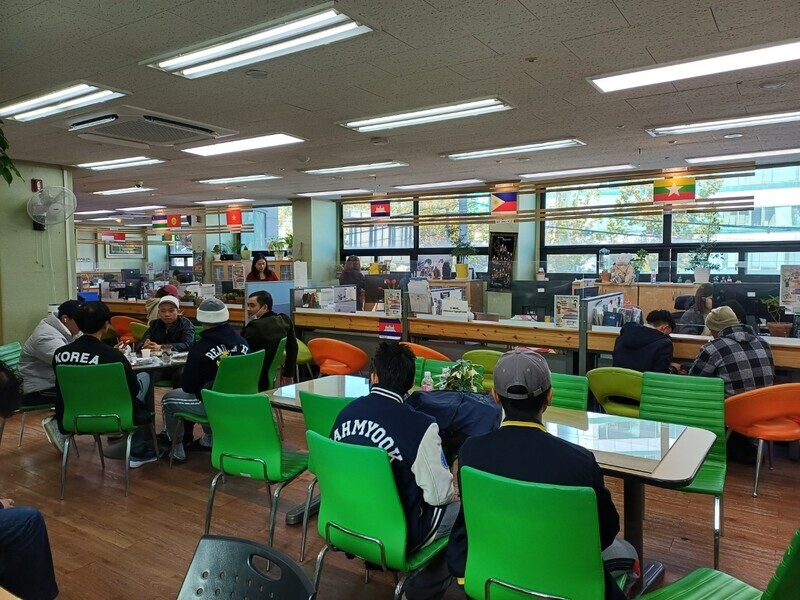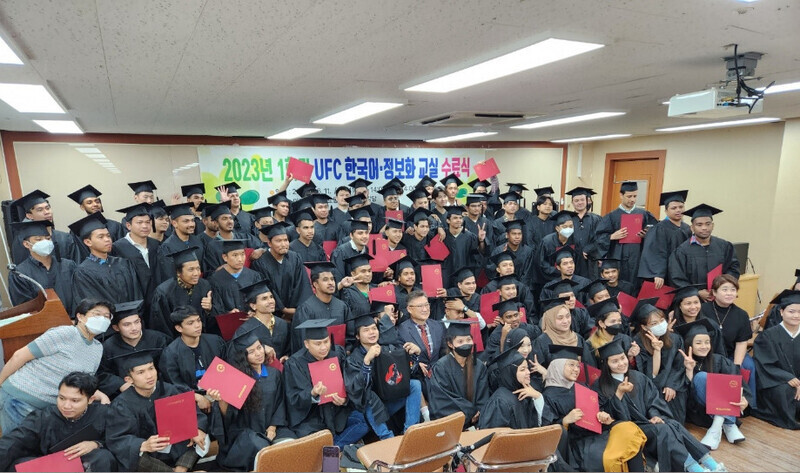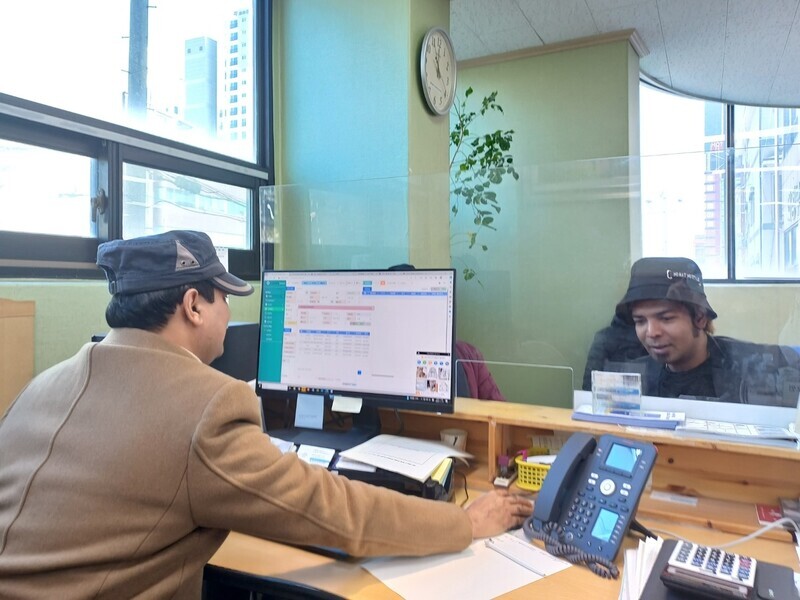hankyoreh
Links to other country sites 다른 나라 사이트 링크
Shuttering all foreign worker support centers, S. Korea leaves migrants to fend for themselves

Islam, a 31-year-old Bangladeshi migrant worker who came to South Korea in April, arrived for work at a furniture factory in Pocheon, Gyeonggi Province, one day in early September. Yet upon his arrival, his boss once again declined to give him any work. For three months, Islam’s boss had refused to assign him work or pay his wages, all without any particular explanation.
This is a common tactic used by Korean bosses to keep migrant workers in line. Struggling to make ends meet, Islam begged for work, but his boss pushed him to the ground and beat him.
If Islam hadn’t sought the help of a foreign worker support center, he would most likely have become an “illegal” immigrant. In reality, many workers in South Korea end up undocumented under similar circumstances: After experiencing harassment by employers or fellow Korean employees, they flee their workplaces, which results in them losing their documented status.
Under current laws in Korea, migrant workers cannot change workplaces without their employer granting permission. Thanks to the foreign worker support center, Islam was able to file a police report about his assault and find different opportunities for work.

When the Hankyoreh visited the Uijeongbu Support Center for Foreign Workers on Nov. 12 it was packed with foreign workers seeking assistance, despite it only being 10 am.
The Uijeongbu center is the only such foreign worker support center in northern Gyeonggi Province. Migrant workers come from Uijeongbu, Dongducheon and Pocheon, as well as from other districts in Gyeonggi Province and neighboring Gangwon Province.
From January through October 2023 alone, the center has conducted 30,767 consultations. However, the center will close next year as a result of the government cutting the entire 7.18 billion won (US$5.58 million) budget for foreign worker support centers like it nationwide.
Despite shuttering all centers dedicated to ensuring the rights of foreign workers, the government is planning to increase the number of foreigners working in South Korea to 120,000 in 2024.
The Ministry of Employment and Labor has said that regional employment and labor offices would conduct counseling and education directly, but those in the field say this is “completely unrealistic.”
“Migrant workers find it difficult to leave their workplaces on weekdays, so most of them come for counseling on Sundays. I find it hard to believe that government offices, which are closed on weekends, will be able to handle them all,” said Kim Tae-il, who serves as head of the Uijeongbu center’s education team.

Another problem that the closure of these centers poses is the collapse of the networks formed by the centers and migrant workers. For most migrant workers, their relationship with the Korean government is incredibly one-sided, with the government’s main job being to crack down and deport them. That will make it difficult for those in need to voluntarily visit offices run by the government to seek help.
The support centers, on the other hand, are staffed by people who have been interacting with migrants in the community for over a decade and have built up trust. At the Uijeongbu center the Hankyoreh visited, not only did many migrants seek consultations about employment and visa issues, but also personal issues such as day-to-day life and family matters.
This network connects Korean society with the migrant community. Migrant workers who have spent years going to the support centers naturally take on leadership roles in their respective communities. They teach the “newcomers” from their countries the rules to follow in Korea and help them resolve their problems above board and according to the law with the help of the support centers.
“If this network disappears, brokers who want money will take over, and crime will increase,” said Lee Sang-gu, the director of the Uijeongbu center.

Yang Mo-min, a 50-year-old naturalized citizen from Bangladesh who works as a counselor at the Uijeongbu center, showed the Hankyoreh his counseling records with Islam. It showed 21 sessions (13 in person and eight over the phone) over the span of two months.
“I don't know if government agencies care about these people as much as the support center does,” Yang said with a sad smile. In front of the consultation desk where Yang sits, migrant workers have signed a petition that reads, “We oppose the closure of the center.”
By Lee Jun-hee, staff reporter
Please direct questions or comments to [english@hani.co.kr]

Editorial・opinion
![[Editorial] Intensifying US-China rivalry means Seoul must address uncertainty with Beijing sooner than later [Editorial] Intensifying US-China rivalry means Seoul must address uncertainty with Beijing sooner than later](https://flexible.img.hani.co.kr/flexible/normal/500/300/imgdb/original/2024/0517/8117159322045222.jpg) [Editorial] Intensifying US-China rivalry means Seoul must address uncertainty with Beijing sooner than later
[Editorial] Intensifying US-China rivalry means Seoul must address uncertainty with Beijing sooner than later![[Column] When ‘fairness’ means hate and violence [Column] When ‘fairness’ means hate and violence](https://flexible.img.hani.co.kr/flexible/normal/500/300/imgdb/original/2024/0516/7417158465908824.jpg) [Column] When ‘fairness’ means hate and violence
[Column] When ‘fairness’ means hate and violence- [Editorial] Yoon must stop abusing authority to shield himself from investigation
- [Column] US troop withdrawal from Korea could be the Acheson Line all over
- [Column] How to win back readers who’ve turned to YouTube for news
- [Column] Welcome to the president’s pity party
- [Editorial] Korea must respond firmly to Japan’s attempt to usurp Line
- [Editorial] Transfers of prosecutors investigating Korea’s first lady send chilling message
- [Column] Will Seoul’s ties with Moscow really recover on their own?
- [Column] Samsung’s ‘lost decade’ and Lee Jae-yong’s mismatched chopsticks
Most viewed articles
- 1[Editorial] Transfers of prosecutors investigating Korea’s first lady send chilling message
- 2For new generation of Chinese artists, discontent is disobedience
- 3S. Korea “monitoring developments” after report of secret Chinese police station in Seoul
- 4Xi, Putin ‘oppose acts of military intimidation’ against N. Korea by US in joint statement
- 5[Exclusive] Unearthed memo suggests Gwangju Uprising missing may have been cremated
- 6N. Korean media upgrades epithet for leader’s daughter from “beloved” to “respected”
- 7Yoon says concern about biased diplomacy is being incited by “communist totalitarian forces”
- 8[Editorial] Intensifying US-China rivalry means Seoul must address uncertainty with Beijing sooner t
- 9[Column] Samsung’s ‘lost decade’ and Lee Jae-yong’s mismatched chopsticks
- 10[Special reportage- part I] Elderly prostitution at Jongmyo Park